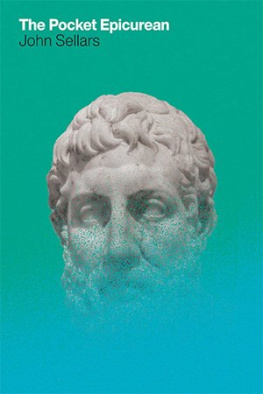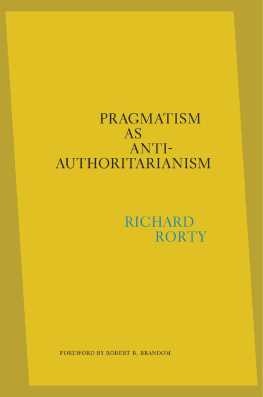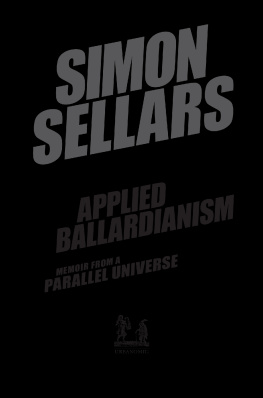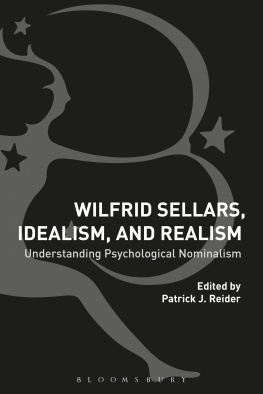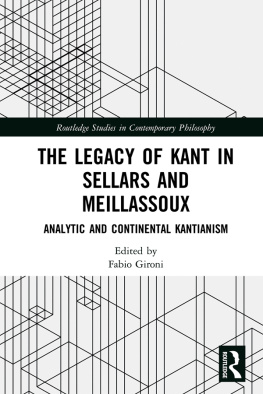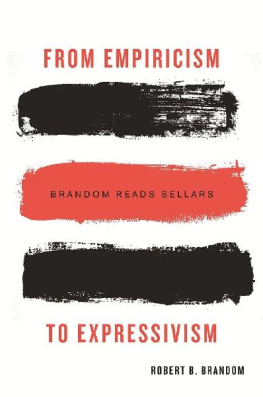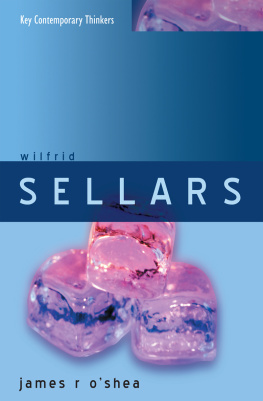Brandom - From empiricism to expressivism: Brandom reads sellars
Here you can read online Brandom - From empiricism to expressivism: Brandom reads sellars full text of the book (entire story) in english for free. Download pdf and epub, get meaning, cover and reviews about this ebook. City: Cambridge etc, year: 2015;2014, publisher: Harvard University Press, genre: Religion. Description of the work, (preface) as well as reviews are available. Best literature library LitArk.com created for fans of good reading and offers a wide selection of genres:
Romance novel
Science fiction
Adventure
Detective
Science
History
Home and family
Prose
Art
Politics
Computer
Non-fiction
Religion
Business
Children
Humor
Choose a favorite category and find really read worthwhile books. Enjoy immersion in the world of imagination, feel the emotions of the characters or learn something new for yourself, make an fascinating discovery.

From empiricism to expressivism: Brandom reads sellars: summary, description and annotation
We offer to read an annotation, description, summary or preface (depends on what the author of the book "From empiricism to expressivism: Brandom reads sellars" wrote himself). If you haven't found the necessary information about the book — write in the comments, we will try to find it.
Brandom: author's other books
Who wrote From empiricism to expressivism: Brandom reads sellars? Find out the surname, the name of the author of the book and a list of all author's works by series.
From empiricism to expressivism: Brandom reads sellars — read online for free the complete book (whole text) full work
Below is the text of the book, divided by pages. System saving the place of the last page read, allows you to conveniently read the book "From empiricism to expressivism: Brandom reads sellars" online for free, without having to search again every time where you left off. Put a bookmark, and you can go to the page where you finished reading at any time.
Font size:
Interval:
Bookmark:
Robert B. Brandom

Harvard University Press
Cambridge, Massachusetts, and London, England
2015
Copyright 2015 by the President and Fellows of Harvard College
All rights reserved
Cover art: Courtesy Thinkstock
Cover design: Graciela Galup
The Library of Congress has catalogued the print edition of this book as follows:
Brandom, Robert.
From empiricism to expressivism : Brandom reads Sellars / Robert B. Brandom.
pages cm
Includes bibliographical references and index.
ISBN 978-0-674-18728-3 (alk. paper)
1. Sellars, Wilfrid. 2. Empiricism. 3. Pragmatism. 4. Expressivism (Ethics) I. Title.
B945.S444B73 2014
170'.42dc23
2014008332
Even without this explicit dedication,
it would be clear that this one is for Wilfrid
Wilfrid Stalker Sellars (19121989) was the greatest American philosopher of the middle years of the twentieth century. The depth, originality, and range of his philosophical thought earn him a place alongside Charles Sanders Peirce, the greatest American philosopher of an earlier generation. From the point of view of contemporary conventional opinion among Anglophone philosophers, this assessment is somewhat eccentricthough not quite idiosyncratic. There is no question that other American philosophers of the time were more influential than Sellarsof those with a large overlap of interests, W. V. O. Quine (19082000) being preeminent among them. But one can also gauge the importance of a philosopher by the wealth of ideas, connections, and projects he bequeaths, by their power and fecundity, their capacity for further development, their potential for further illumination. Peirces scattered, fitful, frustrating writings remain a trove of mostly still-buried treasures. I find in Sellarss more systematic, sustained, if sometimes equally frustrating, writings correspondingly rich veins of philosophical ore.
It was obvious to his contemporaries that Sellars was not only an immensely talented philosopher, but one distinguished from his fellow analysts of the time both by his overtly systematic ambitions and by the self-consciously historical roots of his thought. Although his range of historical reference was very wide, the most important figure for Sellars always was Kant. The subtitle of his most systematic work, his 1966 John Locke lectures, is Variations on Kantian Themes. Being avowedly interested in and influenced by Kant was unusual among analytic philosophers during the period of Sellarss floruit in the late fifties and early sixties. Bertrand Russell and G. E. Moore had forged the fighting faith of analytic philosophy in opposition to the then-dominant British Idealism inspired by Hegel (the passion of their youth), which they properly saw as developing themes already implicit in Kants transcendental idealism. The recoil from Kant in Sellarss philosophical culture circle was not universal. Of those with most influence on Sellars, C. I. Lewis was a self-professed neo-Kantian, who did more than anyone else to keep the teaching of the first Critique alive in American graduate schools of philosophy. And Sellars was in an ideal position to see how deeply influenced by his neo-Kantian background Rudolf Carnap wasperhaps better situated in this regard than Carnap himself.
The efforts in the late sixties of John Rawls in America and Peter Strawson in Britain ensured that Kant would be recovered for later generations not only for the Anglophone canon but as a party to science (natural science as it is at the Peircean end of inquiry, construed as a regulative ideal).
One of Kants big ideas is that what distinguishes judgments and intentional actions from the performances of nondiscursive creatures is that judgments and intentional actions are things we are in a distinctive sense responsible for, they are commitments of ours, they are exercises of authority on the part of their subjects. As such normative statuses, they are things our rational entitlement to which is always potentially at issue. That is, they come with a standing obligation to have reasons for them. Sellars takes over this idea, saying in one of the orienting passages of Empiricism and the Philosophy of Mind:
[In] characterizing an episode or a state as that of knowing, we are
Sellars draws from Kant the insight that epistemic, semantic, and intentional vocabulary is all fraught with ought, as he puts it. Understanding what we are doing when we offer empirical descriptions and explanations requires appreciating the normative character of the space of reasons in which those descriptions and explanations are situated.
Early on he sets the goal of clearing room for a view that goes beyond what he refers to as descriptivism or factualism, a view that sees all claims as empirical in a narrow sense.
[O]nce the tautology The world is described by descriptive concepts is freed from the
His particular target in the essay from which this passage is drawn is alethic modal vocabulary: the language of subjunctive conditionals and of the expression of the laws of nature. The normative vocabulary whose expressive role is to make explicit the liability to demands for justification implicit in the application of concepts in claims to empirical knowledge and judgment generally equally fall within the scope of this dictum. Modal and normative vocabulary, together with ontologically categorizing vocabulary such as property, universal, and proposition are not for Sellars to be understood as in the first instance describing the empirical world. They rather serve the function I described above as categorial in Kants sense: making explicit features of the framework within which empirical description and explanation are possible.
In his earliest published writings, from 194748, Sellars announces himself a convert to what he calls.
When asked in conversation what he hoped the eventual effect of his work would be, Sellars replied that he hoped to begin moving analytic philosophy from its Humean to its Kantian phase. Although.)
One reason this line of thought is easily overlooked is that Sellars never explicitly identified himself with pragmatism. The tradition of American philosophy from which he thought of himself as converting to Carnapian logical analysis in the forties was rather that of his father, Roy Wood Sellars, and the circle of other (now little read) philosophers with whom he debated issues of direct realism, representational realism, and critical realism: figures such as Edwin Bissell Holt, William Pepperell Montague, and Ralph Barton Perry. This group defined itself in no small part by its opposition to Deweyan pragmatism, on the one hand, and to the neo-Hegelian idealists downstream from Josiah Royce, on the other. Nonetheless, like Quinewho also never thought of himself as a pragmatistSellars, if I read him right, did assail empiricism from a pragmatist direction. That he nonetheless never thought of himself as a pragmatist is due, I think, to his emerging from the particular cultural background he did. He says:
Font size:
Interval:
Bookmark:
Similar books «From empiricism to expressivism: Brandom reads sellars»
Look at similar books to From empiricism to expressivism: Brandom reads sellars. We have selected literature similar in name and meaning in the hope of providing readers with more options to find new, interesting, not yet read works.
Discussion, reviews of the book From empiricism to expressivism: Brandom reads sellars and just readers' own opinions. Leave your comments, write what you think about the work, its meaning or the main characters. Specify what exactly you liked and what you didn't like, and why you think so.

